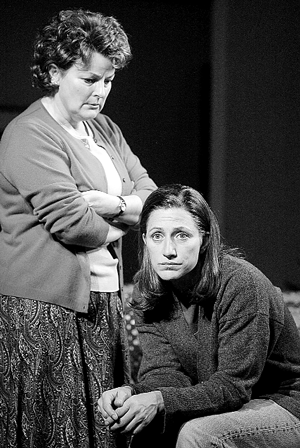Edie Falco as a suicidal daughter who prefers discourse to leaving a note
In the spellbinding Broadway revival of “’Night, Mother,” set designer Neil Patel has prominently placed a clock, set real-time, on the wall of the painfully ordinary living room.
For anyone familiar with this harrowing Pulitzer Prize-winning classic, the otherwise innocent device actually serves as the timer for a bomb destined to detonate at the end of the 90-minute, intermission-less play. And it’s exceedingly unnerving.
The time bomb is, of course, Jessie Cates, a 40-ish, dour depressive who lives with her mother Thelma after having been ditched by her husband and thankless son a few years back.
Ten minutes in, Jessie casually—and with a glint of triumph—announces plans to kill herself later that night, and she means business. She even tricks her hapless mother into helping her locate a pistol hidden in the attic of their ever-so-humble middle American home.
In the precious time remaining, the two women sift through the scraps of the past and swap barbs, with Thelma questioning, chastising and begging her daughter to reconsider. “Not in my house!” she pleads.
Secrets are exposed, lines of communication are unclogged. But it’s too late. When Jessie asks her mother if she’d ever loved her now-deceased father, she barely finishes the question when Thelma says bitterly, “No.”
Hoping against hope, we root for the devastated Thelma to somehow disarm her daughter, though, as the evening winds down, chances grow dim. Not even homemade hot chocolate or rearranging the furniture sparks much interest for Jessie.
Ironically, tonight Jessie is feeling livelier than she has in months. She’s made all kinds of lists, some to aid her mother in running the household after she’s gone. And one for this evening. As Jessie dutifully refills candy jars, empties the fridge, and tends to other chores, she declares that tonight she finally has the stamina to go through with it. After an empty existence of regret and a chronic battle with epilepsy, taking her own life is the one dream she can truly realize. Death is the only solace left, and she’s not ashamed. “Jesus was a suicide if you ask me,” Jessie says.
It’s impossible not to marvel at the delicately nuanced performances in this potently demanding two-person drama. Both women bicker and banter without skipping a beat, thanks in part to the understated direction of Michael Mayer (“Thoroughly Modern Millie”).
As sad-sack Jessie, Edie Falco, in a stringy dull brown wig, looks like one of those “before” hopefuls in an extreme makeover TV show—quite a contrast to her sassy “Sopranos’” role. Falco is so convincing, however, that for long stretches she’s not much fun to be around, and we stop pulling for her as hard as we should. A touch of mania now and then might have perked up her performance, and the production.
Brenda Blethyn’s Thelma is more fully realized, as she lurches along her heart-splitting journey from denial to anger to panic. Though her words insist “It’s not my fault,” Blethyn manages to drench them in guilt. Thelma’s life is certainly no bowl of candy, either, yet she cannot fathom Jessie’s need to question. “I don’t know what I’m here for, and I don’t think about it,” Thelma says. It’s a brilliant piece of acting from this British character actress best known for her award-winning turn in the film “Secrets and Lies.”
Long about 9:30 p.m., as we wait for Jessie to utter the dreaded “‘night, Mother” from the play’s title, all we can do is helplessly watch as the final minutes tick by, close our eyes and put our hands over our ears. And pray that no one we love could ever be so selfish.



































